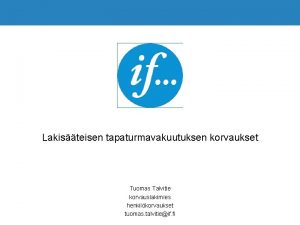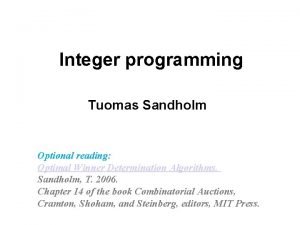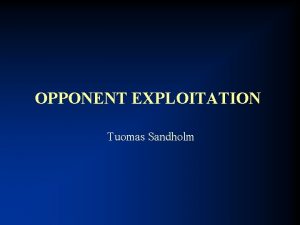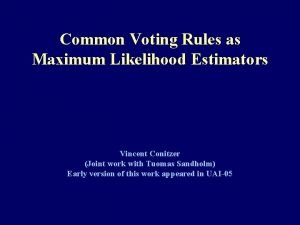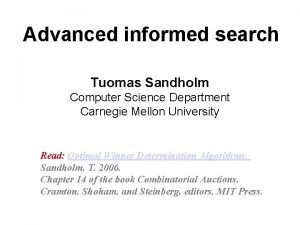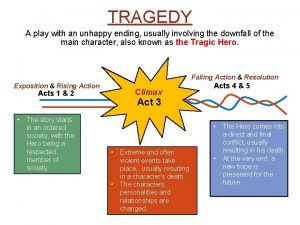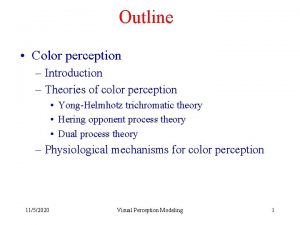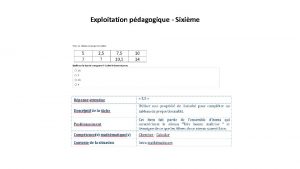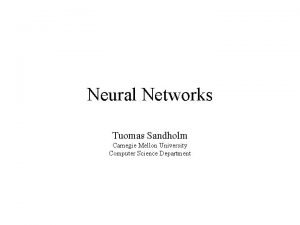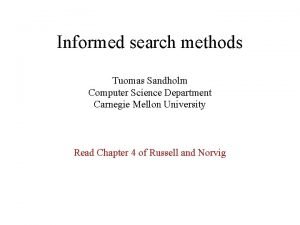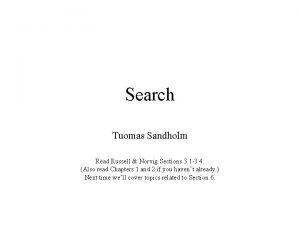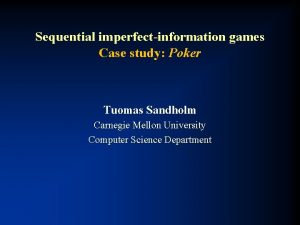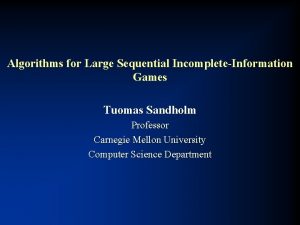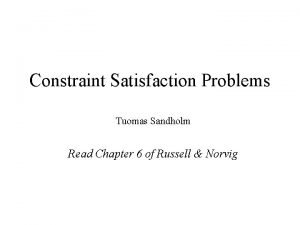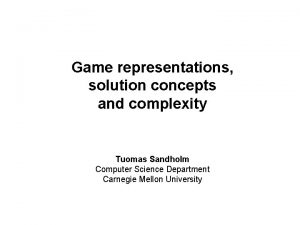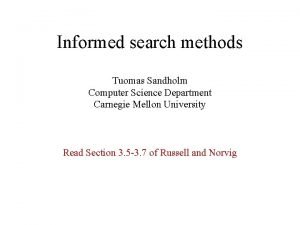OPPONENT EXPLOITATION Tuomas Sandholm Traditionally two approaches to













- Slides: 13

OPPONENT EXPLOITATION Tuomas Sandholm

Traditionally two approaches to tackling games • Game theory approach (abstraction+equilibrium finding) – Safe in 2 -person 0 -sum games – Doesn’t maximally exploit weaknesses in opponent(s) • Opponent modeling/exploitation – Needs prohibitively many repetitions to learn in large games (loses too much during learning) • Crushed by game theory approach in Texas Hold’em • Same would be true of no-regret learning algorithms – Get-taught-and-exploited problem [Sandholm AIJ-07]

Let’s hybridize the two approaches • Start playing based on game theory approach • As we learn opponent(s) deviate from equilibrium, start adjusting our strategy to exploit their weaknesses – Requires no prior knowledge about the opponent – Adjust more in points of the game for which more data is now available [Ganzfried & Sandholm AAMAS-11]

Deviation-Based Best Response (DBBR) algorithm (generalizes to multi-player games) • Compute an approximate equilibrium • Maintain counters of opponent’s play throughout the match • for n = 1 to |public histories| – Compute posterior action probabilities at n (using a Dirichlet prior) – Compute posterior bucket probabilities – Compute model of opponent’s strategy at n • Return best response to the opponent model Many ways to define opponent’s “best” strategy that is consistent with bucket probabilities • L 1 or L 2 distance to equilibrium strategy • Custom weight-shifting algorithm, …

Experiments on opponent exploitation • Significantly outperforms game-theory-based base strategy in 2 -player limit Texas Hold’em against – trivial opponents – weak opponents from AAAI computer poker competitions • Don’t have to turn this on against strong opponents

Experiments on opponent exploitation • Significantly outperforms game-theory-based base strategy in 2 -player limit Texas Hold’em against – trivial opponents – weak opponents from AAAI computer poker competitions • Don’t have to turn this on against strong opponents Opponent: Always fold Opponent: Always raise Win rate 1, 000 #hands 3, 000 Opponent: GUS 2

Other modern approaches to opponent exploitation • ε-safe best response [Johanson, Zinkevich & Bowling NIPS-07, Johanson & Bowling AISTATS-09] • Precompute a small number of strong strategies. Use no-regret learning to choose among them [Bard, Johanson, Burch & Bowling AAMAS-13]

Safe opponent exploitation ? • Definition. Safe strategy achieves at least the value of the (repeated) game in expectation • Is safe exploitation possible (beyond selecting among equilibrium strategies)? [Ganzfried & Sandholm EC-12, TEAC 2015]

When can opponent be exploited safely? • Opponent played an (iterated weakly) dominated strategy? R is a gift but not iteratively weakly dominated L M R U 3 2 10 D 2 3 0 • Opponent played a strategy that isn’t in the support of any eq? R isn’t in the support of any equilibrium but is also not a gift L R U 0 0 D -2 1 • Definition. We received a gift if opponent played a strategy such that we have an equilibrium strategy for which the opponent’s strategy isn’t a best response • Theorem. Safe exploitation is possible iff the game has gifts • E. g. , rock-paper-scissors doesn’t have gifts

Exploitation algorithms 1. Risk what you’ve won so far 2. Risk what you’ve won so far in expectation (over nature’s & own randomization), i. e. , risk the gifts received – Assuming the opponent plays a nemesis in states where we don’t know … • Theorem. A strategy for a 2 -player 0 -sum game is safe iff it never risks more than the gifts received according to #2 • Can be used to make any opponent model / exploitation algorithm safe • No prior (non-eq) opponent exploitation algorithms are safe • #2 experimentally better than more conservative safe exploitation algs • Suffices to lower bound opponent’s mistakes

Another opponent exploitation topic: Learning to win in finite-time zero-sum games • Assumptions: – Score doesn’t matter, except that player with higher score wins – Finite (& discrete) time – Opponent’s strategy is fixed & known => treated as part of the environment • Modeled as finite-horizon undiscounted MDP • Solved using value iteration – Efficient because • every layer contains transitions only into the next layer, and • at iteration k, the only values that change are those for states (s, t, ir) such that t = k – Quadratic in state space size and in time horizon • => Heuristic simplification techniques introduced for large problems – Only change the policy every k steps – Only change policy in the last k steps – Logarithmic time resolution (finer time resolution near the end) [Mc. Millen & Veloso AAAI-07]

Example Input (i. e. , setting): Output (i. e. , optimal strategy): These kinds of strategies happen in many sports, e. g. , sailing, hockey, soccer, …

Current & future research on opponent exploitation • Understanding exploration vs exploitation vs safety • In DBBR, what if there are multiple equilibria or nearequilibria? • Application to other games (medicine [Kroer & Sandholm IJCAI-16], cybersecurity, etc. )
 If tapaturmailmoitus
If tapaturmailmoitus Tuomas linna
Tuomas linna Tuomas sandholm
Tuomas sandholm Tuomas sandholm
Tuomas sandholm Tuomas sandholm
Tuomas sandholm Tuomas sandholm
Tuomas sandholm An opponent or enemy
An opponent or enemy Play with unhappy ending
Play with unhappy ending Opponent process theory vs trichromatic theory
Opponent process theory vs trichromatic theory Sensation and perception
Sensation and perception Theory of color vision
Theory of color vision Overjustification effect psychology definition
Overjustification effect psychology definition Opponent process theory
Opponent process theory Stephen e palmer
Stephen e palmer
